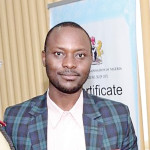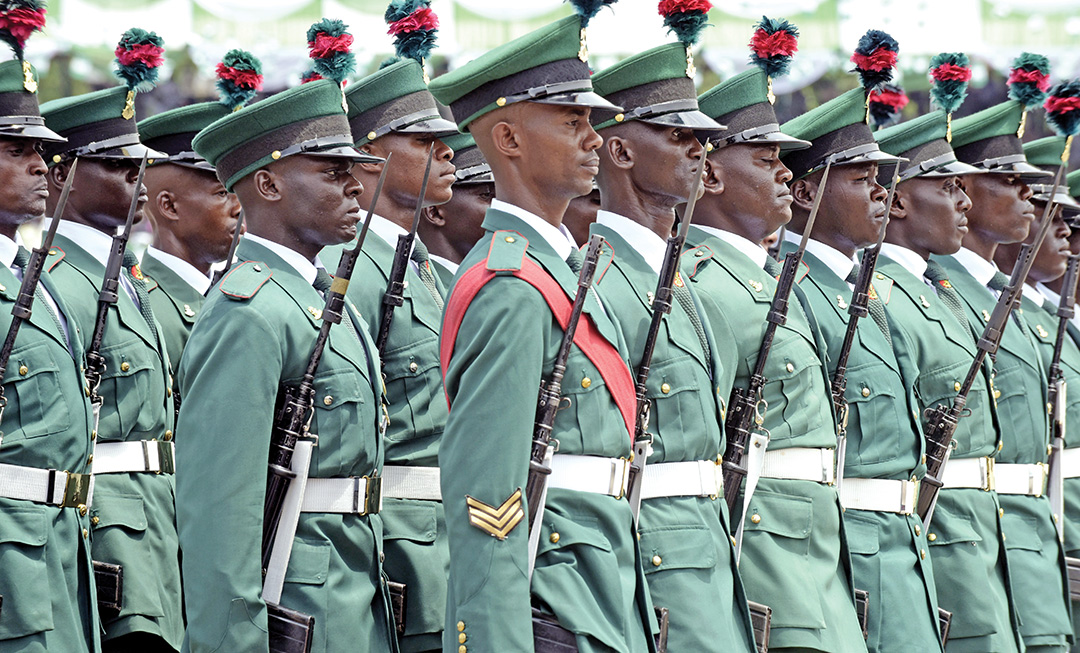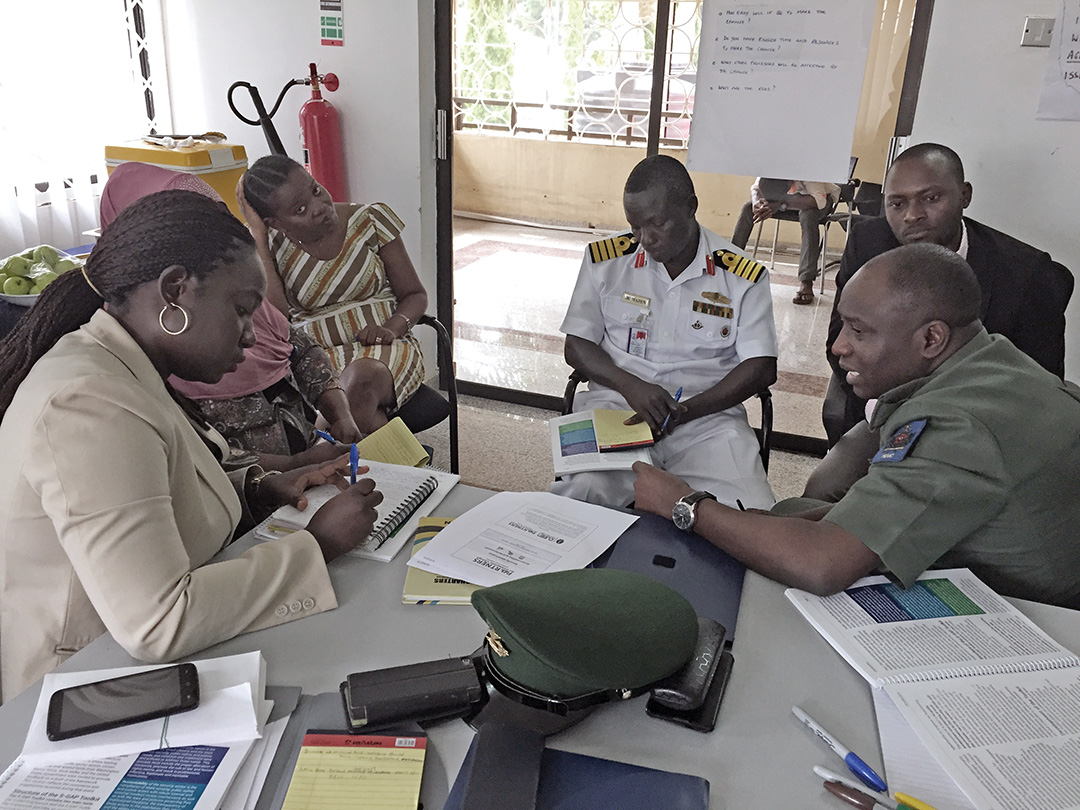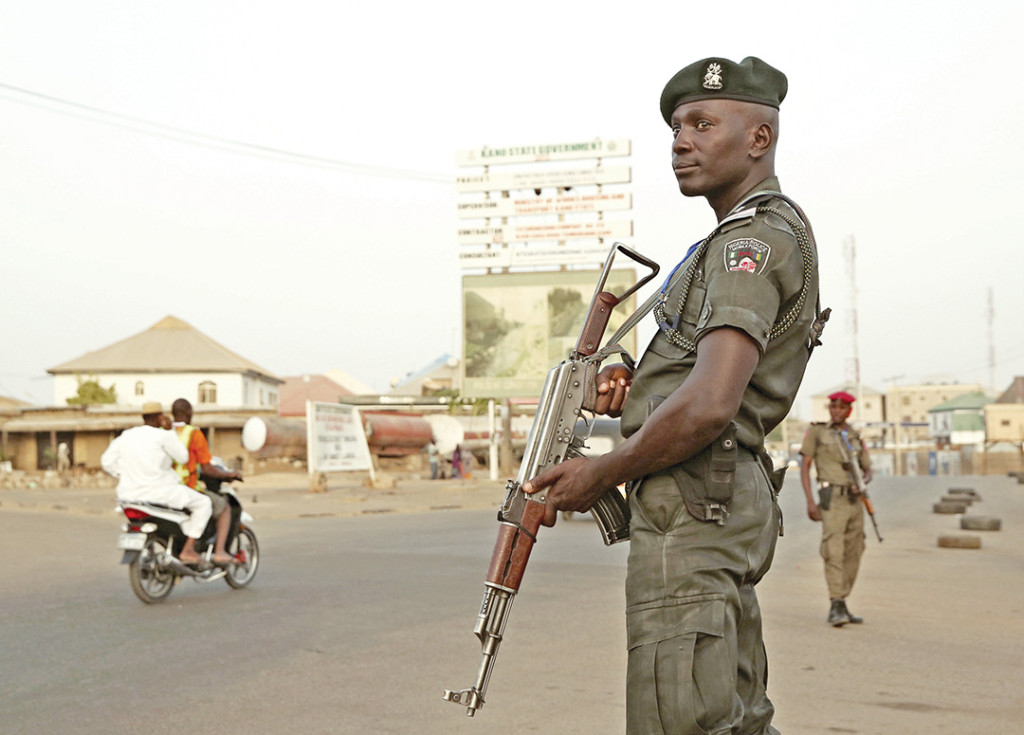Rethinking Civil-Military Dialogue in Nigeria

Nigeria’s long national crisis relating to Boko Haram has been devastating for many reasons. It cost thousands of innocent lives, caused 1.4 million people to flee their homes, and harmed the nation’s image around the world. It also has increased mistrust between civilians and the Armed Forces.
Public confidence in the Nigerian military dropped from 78 percent to 57 percent between 2011 and 2014, according to a Gallup poll of Nigerians. Confidence in the police dropped from 49 percent to 33 percent.
Rebuilding this trust will be a long process and may require extensive security sector reform (SSR). One important facet of the reconstruction process must not be overlooked: dialogue. Nigeria needs a nationwide civil-military dialogue in which civilians and members of the Armed Forces can freely and openly express themselves to create mutual understanding.
A Difficult History
With the rise of terror groups and other violent nonstate actors in many parts of Africa, traditional civil security forces such as the police have found themselves underresourced and overmatched. Many countries have responded by deploying military forces into civil space for the purpose of re-establishing security. In Nigeria, government troops are a common sight in virtually all parts of the country. The performance of the military in this environment hinges on civil cooperation.
The problem is that mistrust exists between the military and civil society. In parts of Africa, this distrust has been caused by years of military domination, which included a culture of intimidation and a blatant disregard for human rights. The view in many young democracies is that the military acts more as an occupying force than a provider of security. Civilians are weary of a culture of impunity in conduct and a sheer lack of accountability and transparency by the senior echelon of the military under the guise of national security.
In Nigeria, this mistrust has a long history. During the colonial era, the British-trained Armed Forces were not designed to serve Nigerians. Violence and divide-and-rule tactics were employed to subjugate the population. Sir Ahmadu Bello, a premier of the northern region and a major figure in Nigerian history, spoke for many civilians when he said of the colonial-era forces: “We do not like the Soldiers; they were our people and had conquered us for strangers.” The military system that emerged in Nigeria after independence followed a similar pattern. From 1966 to 1999, the country was plagued by a series of military coups and countercoups.
The psychological trauma shared by Nigerians has not been erased. It is no surprise that at the outbreak of the Boko Haram crisis, many people in the north, including traditional rulers in Borno State, were against military deployment. They worried that the military would do more harm than good. This was only reinforced by reports of military high-handedness and human-rights violations.
These assumptions and suspicion are sometimes mutual. The military views civil society as not always sympathetic to its mission and believes some civil society organizations (CSOs) wait for every opportunity to criticize the military.

The Importance of Dialogue
Dialogue is a form of communication between people who are seeking the truth together. Dialogue clearly implies that neither side has a monopoly on the truth, but both need to work together to find it. In a nutshell, dialogue is a two-way conversation between people or groups holding significantly differing views but wanting to learn from one another. It is one of the ways parties in disagreement can find peace.
Dialogue should not be confused with debate, since the principle underlying debate is that one side believes it can persuade the other side to adopt a new position. Dialogue must be a shared process. Dialogue is also deeply rooted in African history. Village assemblies and open, public discourse have long been a part of conflict resolution in traditional African societies. A symbol of this dialogue is the baobab tree, which is sometimes the site of village discussions.
In many countries, CSOs are at the vanguard of harnessing dialogue to build working relations between the military and the public. CSOs have become a source for linking the government, its institutions and the civilian community. This puts them in a unique position to promote dialogue between various stakeholders in the security sector and civil society.
Getting the Discussion Started
One important way to make sure dialogue is successful is to hold pre-engagement meetings. These meetings can be used to educate civil society partners before direct dialogues to discuss issues that focus on the principles of citizen security, security management and SSR. These consultations improve the sophistication of the CSOs’ contribution to the dialogues. Coordination among various SSR actors is crucial for the credibility and sustainability of SSR programs. Coordinated SSR interventions also help to increase cost-effectiveness, avoid duplication, manage interactions with a variety of stakeholders, and help to mainstream cross-cutting issues such as gender and human rights.
Another level of consultation is with the leadership of security institutions. Considering the overwhelming influence of security institution leaders, CSOs must galvanize leadership buy-in in a nonadversarial way. The leadership of these institutions must approve of the dialogue. Beginning slowly and focusing on relationship-building, rather than jumping immediately into issues with differing understanding, can soften hard-held views on both sides. Dialogues do not thrive in a tense or uneven atmosphere. The parties must all be willing to seek common ground.
Dialogue among the military, government institutions and civil society stakeholders constitutes a mechanism for addressing mistrust. To effectively entrench accountability and transparency in the military and other security sector institutions, an inclusive dialogue leading to a rapport between civil society and the military must be established.
Dialogue enables civil society to formulate an SSR agenda for engagement with the security forces. Nigeria today clamors for an inclusive reform, accountability and transparency of security sector institutions. For example, Nigeria’s National Human Rights Commission has investigated alleged military misdeeds in the town of Baga and the Apo neighborhood of Abuja. Similarly, a number of civil society organizations are tracking and monitoring security sector spending. The military should embrace these efforts by CSOs and work with them to develop a road map for reform that improves transparency and prioritizes human rights. Success will be possible only if stakeholders within the military show commitment.
The CLEEN Foundation, a nongovernmental organization that promotes public safety, security and justice, has taken the lead on civil-military dialogue. With support from the National Endowment for Democracy, the CLEEN Foundation seeks to strengthen civil-military relations by fostering sustained dialogue and understanding to improve accountability, security and human rights. A list of issues to be addressed will be jointly developed. One state in each of Nigeria’s six geopolitical zones has been selected for local CSOs to hold dialogue events and for the military formations in those states to implement the action. In dialogue, the civil society must understand that distrust is mutual. In some cases in which the military is facing internal and external guerrilla warfare, it has accused civilians of deliberately working to undermine its efforts. Civil society also has accused the military of excessive use of force, corruption and lack of transparency. The nation’s security requires both sides to come to the table and develop a mutual understanding.
This process is continuous. To gain widespread buy-in and to promote local ownership, we must coordinate a series of strategic public dissemination events to inform the public. This coordination could be done through multilevel groups to develop mechanisms for monitoring the compliance and implementation of the plan. It also affords the public opportunities to ask questions and receive immediate answers. Public sensitization on an action plan offers parties the opportunity to harvest information for review and improvement.
Nigeria boasts a booming economy, a thriving democracy and a bright future. We can all help ensure its security by coming together through dialogue.

Idamwenhor Napoleon Enayaba is a development practitioner with experience in conflict resolution, good governance, public oversight, accountability, safety and security. He holds a degree in history from the University of Benin and a degree in conflict, security and development from the Nigeria Defence Academy. Enayaba previously worked with the CLEEN Foundation as a program officer on public safety and security. He has been active in security sector reform in Nigeria and initiated a program area in the CLEEN Foundation that focuses on civil-military relations.

